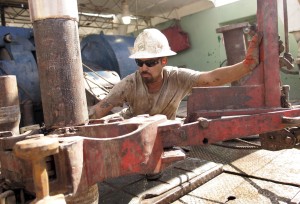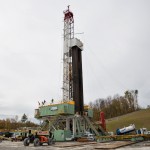Fracking in Texas helps the state’s public school fund top Harvard’s endowment

Mike Fuentes / AP
Lenny Rodriguez works on a Choice Exploration Inc. natural gas rig near Devers, Texas. Drilling on state lands has helped create the largest public school endowment in the country.
A fund that collects rents and royalties from oil and natural gas development to Texas public schools recently became the largest education endowment in the country.
The publicly run endowment, called the Permanent School Fund, is worth $37.7 billion dollars. That’s $1.3 billion more than Harvard University’s $36.4 billion endowment. Jim Suydam, a spokesperson for the Texas General Land Office, says a big part of the story is the shale gas boom.
“We’re making a ton of money off natural gas,” said Suydam. “We made over a billion last year. The shale plays are huge down here. You can see them from space.”
Suydam says that from 1874 to 2003, $7.9 billion was deposited into the fund. Since 2003, just before the shale gas boom began, oil and natural gas has helped increase the endowment by $8.1 billion. These deposits have generated enough return on investments to bring the grand total close to $40 billion. The Permanent School Fund doesn’t cover all expenses for Texas school children, but Suydam says it contributes an average of $400 per student per year. It also backs bonds by local school districts, allowing them to get a triple-A rating.
The Permanent School Fund dates back to the 1800′s, to the time when Texas was an independent public and had more land than cash. So lawmakers tied government lands to a special fund that helps build and maintain public schools. In essence, the state fund is a giant landowner that leases its surface and mineral rights to private companies, and charges a 25 percent royalty on the oil and gas. The Permanent School Fund also leases land to cattle ranchers and sells water rights.
“We will try to make a buck off of every acre we can,” said Suydam. “That’s our job.”
